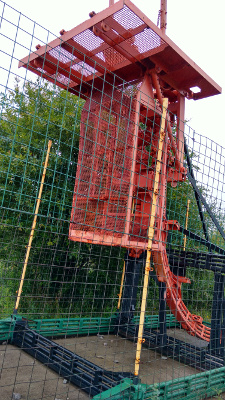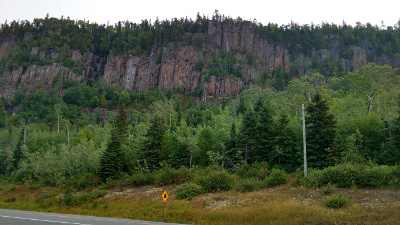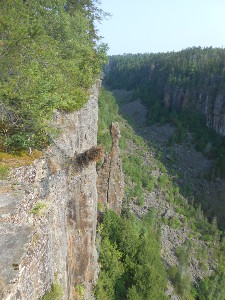 Moose mounted in lodge
Moose mounted in lodge
The rain had a lot to do with it.
 Moose mounted in lodge
Moose mounted in lodge
We had just spent many beautiful days moving through the Upper Peninsula of Michigan, then crossing into Ontario at Sault Ste Marie where we enjoyed watching the boats passing through the locks. We plan to stay in Canada, until the weather in the U.S. turns cooler. We decided to drive along the shore of Lake Superior, the most Northern of the Great Lakes.
Wawa, Ontario, carries the Ojibwa name for Wild Goose, and there are several giant statues along the highway illustrating its mascot. When we tried earlier to make a reservation online, we were discouraged by finding many motels not available, or closed, so when we found a hunting and fishing lodge and cabins with a vacancy we hastened to reserve a cabin. It would be a four-hour trip north from Sault Ste Marie, then another four-hour trip west to Terrace Bay, and yet a third four-hour trip to Thunder Bay. Wawa was a necessary stop for us.
 Timber wolves
Timber wolves
We had forgotten a lesson we learned several years ago: while Eastern Ontario has many cities and towns and is accustomed to tourists, this is not true in Western Ontario. We drove north along the eastern side of Lake Superior. We were in the forest, sometimes in provincial parks, sometimes just in forested land, without any sign of habitation along the road. It rained harder and harder.
The rain had diminished to showers when we turned off the highway and started down the dirt road as directed. This was going to be a new experience for us - spending time where people flew in to fish and hunt. We realized it would be an expensive night's stay, but after all, this must be a pretty upscale place, with the prices they charged. We were a bit concerned because we didn't see any signs for the place we had reserved - Air-Dale Hunting and Fishing - but instead we found some weather-beaten signs for  Elsa in cabin
Totomenai Lodge. We persevered.
Elsa in cabin
Totomenai Lodge. We persevered.
We found the lodge at the very end of the road. But there were no lights on and the door was locked. That's when we realized that we had no cell phone signal. It started raining a little bit harder.
About ten minutes later, Bob noticed movement inside the lodge and soon a woman was opening the door, inviting us in. She told us about buying the older property, Totomenai, just a year or so earlier after having worked in the area in fly-in hunting and fishing properties. We looked around at the stuffed animals in the rafters, and felt we were in an exotic location.
Our cabin would be ready shortly, she told us, and disappeared again. We looked at the book of photos of happy sportsmen and their catches (mostly large fish). In another half hour, the woman reappeared and escorted us across the  Whitefish Lake through porch
parking lot to the second cabin in a row of six or eight. She opened the door (they don't use keys there), turned on the space heater inside, and disappeared once more.
Whitefish Lake through porch
parking lot to the second cabin in a row of six or eight. She opened the door (they don't use keys there), turned on the space heater inside, and disappeared once more.
We carried in our suitcases and computers and a bag with snacks and books. That's when we realized that something in the cover of our cargo compartment had sprung a leak. Bob's suitcase was covered with a puddle of water, Elsa's not so bad but still damp.
We settled in, laying out wet clothes to dry, experimenting with the space heater. We went to bed somewhat earlier than usual. We had hoped to spot deer or moose at the lake during the evening or early morning, but we never did see any wildlife there.
The following morning, we were up early and back on the road a good hour before the start of their breakfast hours (we wondered why a  Alimak Raise Climber
fishing lodge doesn't start serving before dawn), driving into Wawa for breakfast at a restaurant remembered from a previous trip. Sadly, the town seemed to have more FOR SALE signs than ever, and even several motels were closed (explaining our difficulty in finding a room).
Alimak Raise Climber
fishing lodge doesn't start serving before dawn), driving into Wawa for breakfast at a restaurant remembered from a previous trip. Sadly, the town seemed to have more FOR SALE signs than ever, and even several motels were closed (explaining our difficulty in finding a room).
But the rain had stopped, except for the occasional small shower, as we drove westward. Near the tiny town of Helmo, we found a complicated piece of machinery called the Alimak Raise Climber. It was carefully protected by a metal cage and looked exactly like something that somebody could climb. The accompanying text says, "The Alimak raise climber was invented by Linden Alimak in 1952 in Skellettea, Sweden. It has become one of the most efficient and safest methods of driving raises underground. It was important in the Hemlo mining camp from the beginning in the early 1980's, for driving ventilation raises & ore/waste passes... Has been  Aguasabon Falls
instrumental in refining a method of stope mining using the Alimak". We found this so incomprehensible that we think we need the knowledge of a real engineer, so we are asking Elsa's cousin Earl what he thinks about it.
Aguasabon Falls
instrumental in refining a method of stope mining using the Alimak". We found this so incomprehensible that we think we need the knowledge of a real engineer, so we are asking Elsa's cousin Earl what he thinks about it.
This part of our road was shown on the map as going right along the shore of Lake Superior, but our glimpses of the actual lake were few, because of the dense green forests. There was a large national park (725 square miles) but no roads going to it. In northern Canada most recreational activities are designed for the athletic, not the geriatric! We imagined the moose and bears until we reached our destination of Terrace Bay, where they were setting up for the annual Lighthouse Festival.
We found lunch in Terrace Bay at a restaurant named Drifters, and started out for our next motel. It turned out that we had  View of palisades
overshot the motel by a half hour (because of the road construction), but we didn't learn it until we checked with the local tourist information office. Our reservation was for a motel in Terrace Bay, according to the post office, but the place itself was in Jackfish, maybe 20 kilometers further East; Jackfish doesn't have a post office of its own. We had missed it because we hadn't fully understood the owner's directions, and because the motel was almost completely blocked from the highway by a road construction crew.
View of palisades
overshot the motel by a half hour (because of the road construction), but we didn't learn it until we checked with the local tourist information office. Our reservation was for a motel in Terrace Bay, according to the post office, but the place itself was in Jackfish, maybe 20 kilometers further East; Jackfish doesn't have a post office of its own. We had missed it because we hadn't fully understood the owner's directions, and because the motel was almost completely blocked from the highway by a road construction crew.
Returning along the highway toward Wawa, we finally saw it. We pulled around a string of cars and trucks waiting to pass through the construction zone and found the driveway up the hill to the motel.
Once again, it was empty and the door was locked. A note on the office door said they had gone into town and would return at 3 p.m. It was then 1:15.
 Paddle to the Sea Park
Paddle to the Sea Park
Around 2:30, the owners pulled up and we prepared to greet them, but it was a bit awkward because they seemed to feel that we should have waited till check-in time, 4:00, to arrive. So we negotiated a one-night stay rather than a longer one because we realized that we would feel too cramped in the small (but beautifully kept) room. We were able to extend our next stay in Thunder Bay.
On Sunday morning, we were again on the road near daybreak, still unluckily watching out for wildlife. The rain had almost stopped, and after passing through some thick fog banks we entered the beautiful Lake Superior shore forests.
Just east of Terrace Bay we found Aguasabon Falls, which treated us to views of a spectacular waterfall system. Canada's  Forested canyon
waterfalls are plentiful and often used as part of their hydroelectric system, which allows them to provide visitor access through trails and sturdy metal stair steps. The crashing water created a mist rising from the floor of the chasm towards the viewing platform. It was flat out gorgeous! Our luck was changing with the weather.
Forested canyon
waterfalls are plentiful and often used as part of their hydroelectric system, which allows them to provide visitor access through trails and sturdy metal stair steps. The crashing water created a mist rising from the floor of the chasm towards the viewing platform. It was flat out gorgeous! Our luck was changing with the weather.
In Nipigon, we saw part of a new children's park. A classic of children's literature, Paddle-to-the-Sea, written in the 1940s, was set in this part of Ontario and is the story of an Indian and his canoe making a magical  Monolith in Ouimet Canyon
journey to the ocean. Now the city has traced the journey in a series of structures and parks, and as we watched, people were setting up for their annual festival, the Blueberry Blast (a shuttle bus delivers folks to the nearby blueberry fields where they can pick as much as they want).
Monolith in Ouimet Canyon
journey to the ocean. Now the city has traced the journey in a series of structures and parks, and as we watched, people were setting up for their annual festival, the Blueberry Blast (a shuttle bus delivers folks to the nearby blueberry fields where they can pick as much as they want).
An hour later we turned off the highway for a side trip to the spectacularly deep Ouimet Canyon. A short hike took us to two lovely and sturdy viewing pods built out into thin air overlooking the sheer walls and remote, cold canyon floor.
Now we are in Thunder Bay, near the Western edge of Ontario. We are beginning a series of stays at some hotel chains more familiar to us, and we have decided that any future explorations involving wildlife, backwoods journeys or untried overnight experiences will be limited to whatever we read in books.